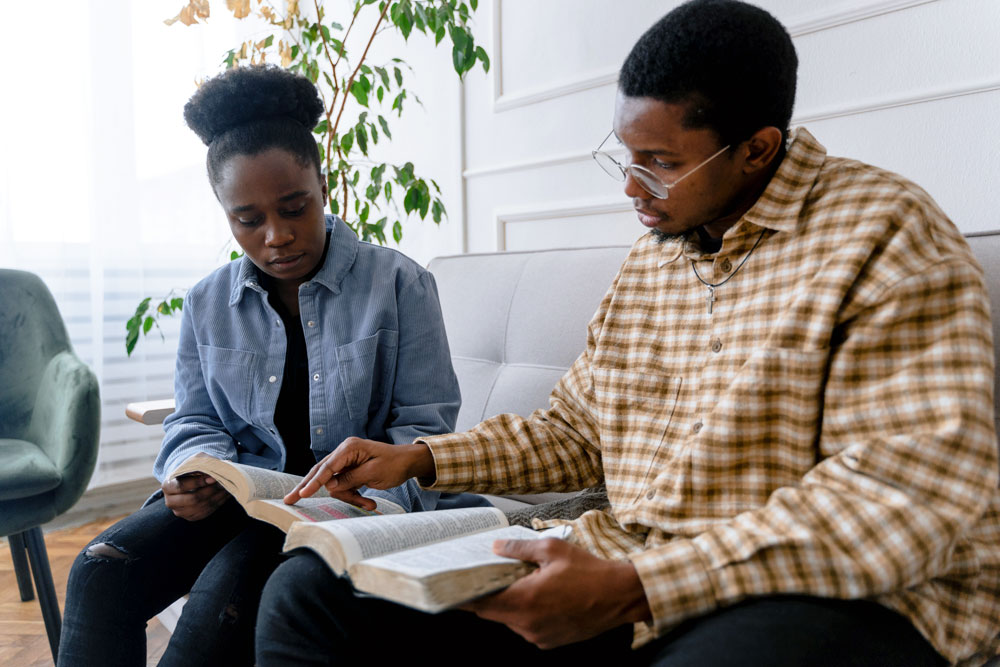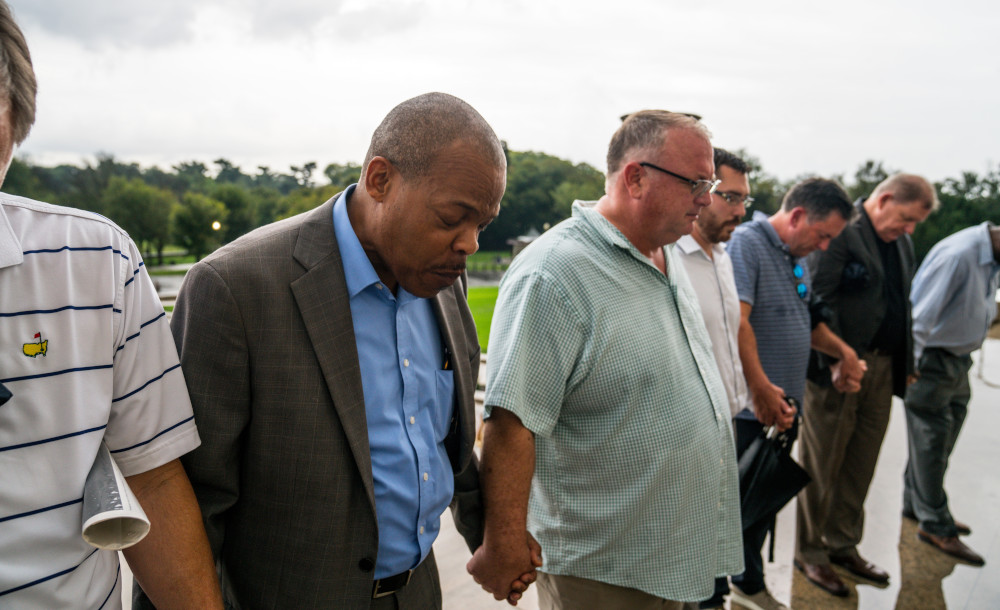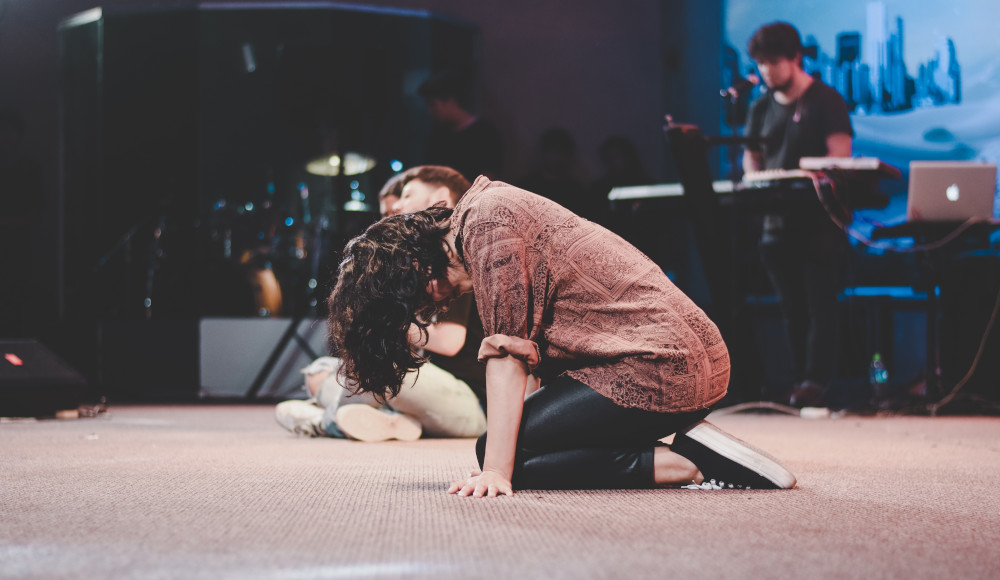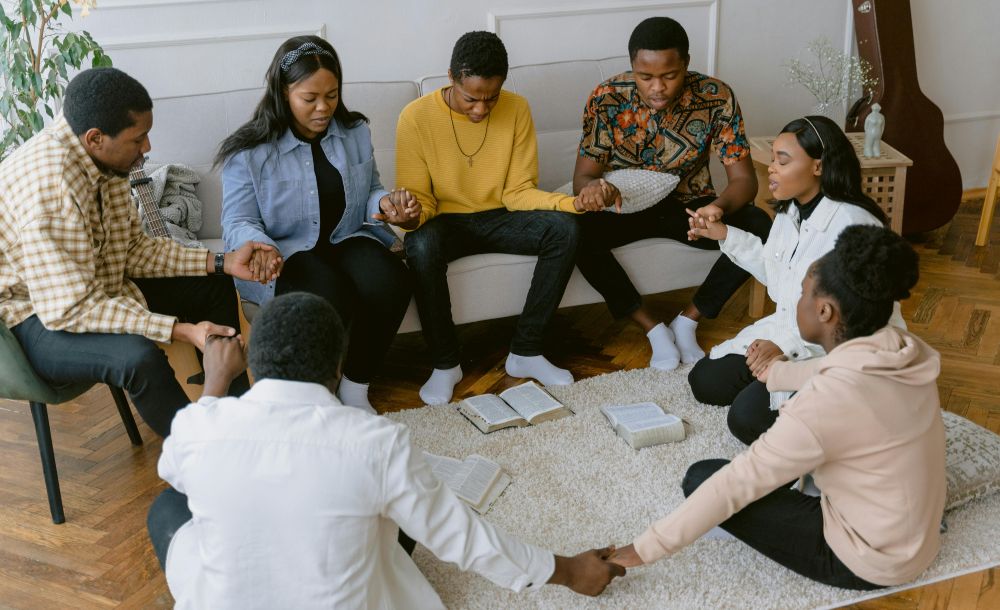One Sunday morning, I was in church when the pastor asked everyone dealing with migraines to stand up. Then he did something unexpected. He called forward all the people who had been healed from migraines.
As these testimonies lined up, something powerful happened. The congregation began to pray one for another, and I watched as person after person received their healing right there. It wasn’t magic. It wasn’t manipulation. It was the simple, profound power of believers coming together to pray for each other’s needs.
That morning, I saw what the Apostle James meant when he wrote,
“Confess your faults one to another, and pray one for another, that ye may be healed.” – James 5:16 (KJV)
This isn’t just a nice suggestion—it is God’s design for how His people should care for each other.
Key Takeaways
- Community prayer is God’s design. We’re not meant to face challenges alone.
- Faith multiplies when joined together. Your weak faith can be strengthened by others.
- Healing comes through love and prayer. Physical, emotional and spiritual restoration happens when we pray for one another.
- Everyone has a role. You don’t need special qualifications to pray effectively for others.
- Confession creates connection. Sharing struggles in safe spaces leads to breakthroughs.
Understanding the Biblical Foundation to Pray One for Another

The Heart of James 5:16
When we examine James 5:16 in the King James Version, we find a powerful promise:
“Confess your faults one to another, and pray one for another, that ye may be healed. The effectual fervent prayer of a righteous man availeth much.”
This verse contains three crucial elements:
- Confession: “Confess your faults one to another.”
- Prayer: “Pray one for another.”
- Promise: “That ye may be healed.”
The word “may” here doesn’t suggest uncertainty. In the original text, it points to the certain outcome when believers pray for one another in faith. When we pray for one another, healing becomes available and accessible.
Why God Designed Us for Community Prayer
God intentionally created us to need each other. The instruction to “confess your sins to one another and pray for one another” creates a space for love and vulnerability, not judgment.
When someone confesses their faults to you, they’re not looking for criticism. They’re seeking restoration and healing through prayer.
Think about it. Would you confess your deepest struggles to someone who would judge you? Of course not. You’d share with someone who loves you, someone who would encourage you and lift you up. That’s exactly what a Christian community should provide.
The Power of Fervent Prayer When We Pray for One Another

What Makes Prayer Effective?
The verse tells us that “the effectual fervent prayer of a righteous man availeth much.” Let’s break this down:
- Effectual: Working, producing results.
- Fervent: Passionate, earnest, heartfelt.
- Righteous: Made right with God through faith.
- Availeth much: Accomplishes great things.
When we pray for one another with genuine love and expectation, we’re not merely wishing for good outcomes.. We’re participating in God’s plan for healing and restoration.
The Multiplication Effect of Joined Faith
Something extraordinary happens when believers come together to pray for each other. It’s not just about adding more prayers—it’s about joining faith together.
When your faith feels weak, someone else’s strong faith can undergird you. When you’re too hurt to believe for yourself, others can believe with you and for you.
The prayer of a righteous person is powerful and effective. When multiple righteous people join their prayers, the power multiplies. This is why Jesus said,
“Again I say unto you, That if two of you shall agree on earth as touching any thing that they shall ask, it shall be done for them of my Father which is in heaven.” – Matthew 18:19 (KJV)
How to Create an Environment Where People Pray One for Another

Build Safe Spaces for Confession
For people to feel comfortable enough to confess their faults one to another, we must create environments of safety and love. This means:
- No gossip: What’s shared in prayer stays in prayer.
- No judgment: We approach each other with the same mercy Christ shows us.
- Active listening: We hear with our hearts, not just our ears.
- Consistent availability: We make ourselves available when others need prayer.
Respond with Love, Not Judgment
When someone shares their struggles with you, remember that “love draws you back in.” Your role isn’t to analyze what they did wrong or why they’re struggling. Your job is to restore them—to help them get back to a place of strength and wholeness.
As the Scripture says in Galatians 6:1 (KJV),
“Brethren, if a man be overtaken in a fault, ye which are spiritual, restore such an one in the spirit of meekness; considering thyself, lest thou also be tempted.”
We restore others remembering that we’re all human and capable of making mistakes.
Practical Ways to Pray for One Another Effectively

Move Beyond Selfish Prayer
When we’re dealing with our own challenges, it’s natural to focus on ourselves. But there’s something powerful that happens when we shift our focus to others. When you’re thinking about someone else’s needs, you’re not consumed with your own problems.
This shift actually positions you to receive from God in unexpected ways.
Pray with Expectation and Faith
When we pray for one another, we should pray with expectation. For example, don’t pray “if it be Your will” when Scripture has already revealed God’s will for healing. The prayer offered in faith will make the sick person well, and the Lord will raise them up (James 5:15).
Here are practical steps for effective prayer:
- Listen carefully to understand the specific need.
- Pray with authority in Jesus’ name.
- Expect results based on God’s promises.
- Follow up to encourage and support.
- Celebrate testimonies when healing comes.
The Broader Impact When We Pray One for Another

Beyond Physical Healing
While physical healing is certainly included in God’s promise, praying for one another encompasses much more:
- Emotional healing from trauma, hurt, and past wounds.
- Spiritual breakthrough in areas of struggle and bondage.
- Relationship restoration with family, friends, and colleagues.
- Financial provision and wisdom in stewardship.
- Protection and safety in dangerous situations.
- Wisdom and guidance for important decisions.
Build a Culture of Faith
When we consistently pray one for another, we create a culture where people expect good things from God. They begin believing that healing is not just possible but probable. This kind of atmosphere becomes fertile ground for miracles.
People start coming to church not just to hear a message, but expecting to encounter God’s power. They bring their needs knowing that others will stand with them in prayer and believe for their breakthrough.
Supporting Scripture That Encourages Us to Pray for One Another

New Testament Examples
The apostle Paul frequently asked others to pray for him and promised to pray for them:
- Ephesians 6:18-19: “Praying always with all prayer and supplication in the Spirit… and for me, that utterance may be given unto me.”
- Colossians 4:3: “Withal praying also for us, that God would open unto us a door of utterance.”
- 1 Thessalonians 5:25: “Brethren, pray for us.”
Old Testament Foundations
The principle of intercession runs throughout Scripture.
- Job 42:10: “And the Lord turned the captivity of Job, when he prayed for his friends.”
- 1 Samuel 12:23: “God forbid that I should sin against the Lord in ceasing to pray for you.”
Your Role in God’s Plan to Pray One for Another

Everyone Can Participate
You don’t need to be a pastor or ministry leader to pray effectively for others. You simply need to be someone who loves God and loves people. Your prayers, joined with others who care, become a powerful force for good in someone’s life.
God has positioned you in your community, family, and circle of influence for a purpose. The people around you aren’t there by accident—they’re there by divine appointment. When someone shares a struggle with you, it’s an opportunity to be part of God’s healing work in their life.
Bear One Another’s Burdens
Galatians 6:2 (KJV) tells us to:
“Bear ye one another’s burdens, and so fulfil the law of Christ.”
When we pray for one another, we’re literally carrying each other’s loads. We’re sharing the weight of struggle and multiplying the strength to overcome.
Conclusion
The call to pray one for another isn’t just a nice suggestion—it’s God’s design for how His people should function. In a world where many feel lonely, the church offers hope, healing, and restoration through community prayer.
When we commit to praying for one another with sincere hearts and genuine faith, we witness God’s power at work in extraordinary ways. We see bodies healed, hearts mended, and lives transformed. Most importantly, we experience the joy of being part of God’s healing work in the world.
Remember: when we pray one for another, we’re not just hoping something good might happen. We’re participating in God’s plan for healing and restoration. That’s a privilege worth embracing with our whole hearts.
Start today by asking someone how you can pray for them, and watch how God uses you to transform both their life and yours.
Frequently Asked Questions
Q. What does it mean to “pray one for another” in the Bible?
A. To pray one for another means believers should actively intercede for each other’s needs, struggles, and healing. James 5:16 instructs us to “confess your faults one to another, and pray one for another, that ye may be healed.” This creates a community where people support each other through prayer.
Q. Why should we confess our faults to one another?
A. Confession removes the power of shame and secrecy. When we confess our faults one to another, we’re not seeking judgment but restoration. It lets others pray for our needs. It also offers support and encouragement on our spiritual journey.
Q. Does “pray one for another” guarantee healing?
A. The effectual fervent prayer of a righteous man availeth much (James 5:16, KJV). When we pray for one another in faith and love, God’s power is available for healing and restoration.
Q. Who qualifies as “righteous” to pray for others?
A. Every believer is made righteous through faith in Jesus Christ. You don’t need special qualifications or perfect behavior to pray effectively for others. The righteous person is powerful and effective in prayer because of their relationship with God, not their own perfection.
Q. How often should we pray for one another?
A. Scripture encourages us to “pray without ceasing” (1 Thessalonians 5:17) and to “exhort one another daily” (Hebrews 3:13). There’s no limit to how often we should pray for each other. The more we pray for one another, the stronger our community becomes.
Q. What should I do if someone asks me to pray for them?
A. When someone asks for prayer, take it seriously. Listen carefully to their need, pray with them immediately if possible, and continue to remember them in your prayers. Follow up to show you care and celebrate with them when God answers prayer.





